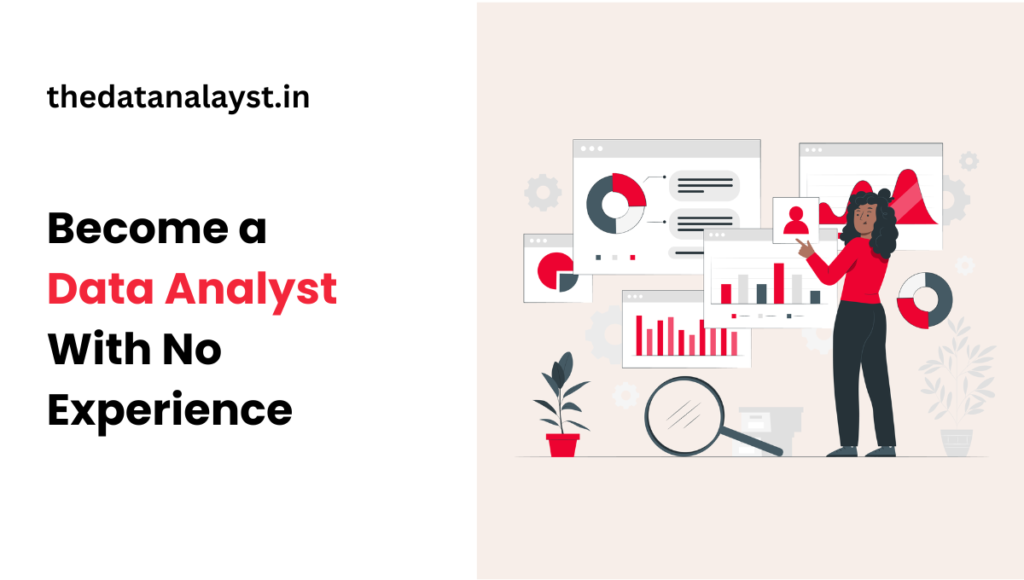
You want to be a Data Analyst but you are not sure how , well no worries this guide on becoming a data analyst will answer every single question in your mind .
First of all you need to understand that the data is the new oil and that is the reason why the demand for skilled data analysts is growing rapidly, making it an attractive career path.
But what if you have no experience? The good news is that becoming a data analyst is entirely achievable, even for those starting from scratch.
This guide will help you if you are just a fresher or if you are already working but you need a change.
This comprehensive Data Analyst Roadmap on How To Become A Data Analyst With No Experience will walk you through every step needed to break into the field of data analysis with no prior experience.
Before understanding how you can become a data analyst you must need to understand what is it that an analyst do and what is the work you will be expected to do as an analyst.
What do data analyst do ?
As we already know that information is king. but what good is all that data if you can’t make sense of it? And that is where data analysts come in – they’re the heroes who helps businesses make sense out of the data derive insights so that important decisions can be made.
It might seem like very simple to read but to get out the insights from data but it is complete process like first you have to remove some irregularities from data or connect different types of and so much more.
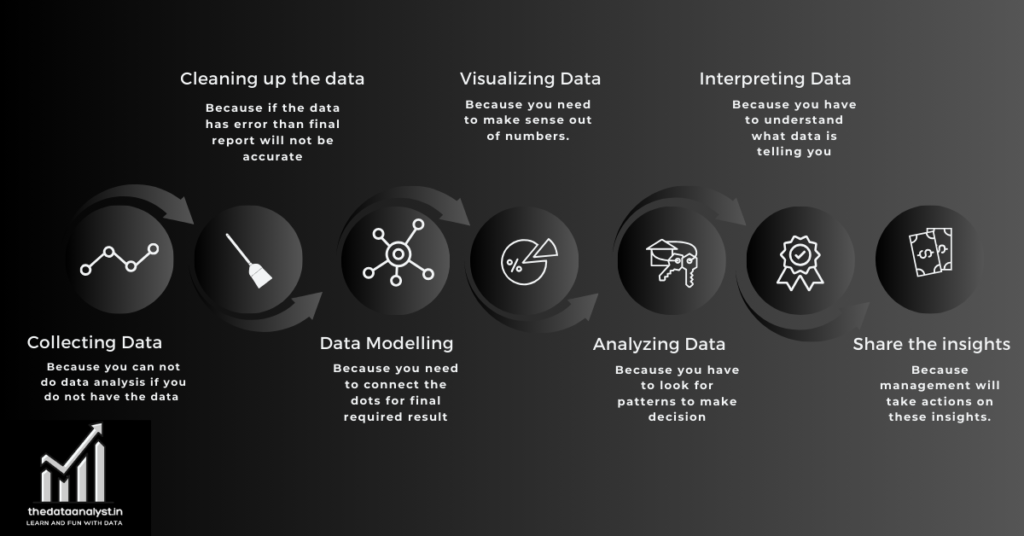
Tasks and Responsibilities of a Data Analyst
Every job or profile has its own set of roles and responsibilities which it is expected to do.
Let us understand what are the tasks and things you have to do as Data Analyst.
Step 1 – Collecting Data
Imagine you have to go from one place to another but you do not have a vehicle , just like that imagine unless you do not have data how will you extract data from it.
So the first task Data analysts start by gathering data from various sources. This can include databases, spreadsheets, and even real-time data from sensors or web traffic. The goal is to compile a comprehensive dataset that can be analyzed to uncover insights.
Step 2 – Cleaning up the data
Again imagine if there are some impurities in the fuel you are using then there are high chances that your vehicle will not give the best performance and same is the case with data.
Data isn’t always neat and tidy. As a analysts you will be spending huge amount of time cleaning and organizing data sets. This might involve removing errors, filling in missing information, and ensuring everything is consistent.
Step 3 – Data Modelling
Sometimes you will be getting data from multiple sources or multiple different files , so many a times you will have combine the data before working on it.
For example you have sales data for each month in a separate file but you need to analyze the yearly trend so here before analyzing the data you have combine the data to get final desired output
Step 4 – Visualizing Data
It is quite impossible to understand the data in its raw form so here as an analyst you will take the help of visualization tools to convert data into visuals .
As an data analysts you will create visuals like charts, graphs, and dashboards. These visuals make it easier for stakeholders to understand the insights and make informed decisions.
Imagine trying to understand yearly sales trend with a line chart and see how easy it becomes to judge which month had maximum sales and which had least .
Step 5 – Analyzing Data
This is where the magic happens. As an analyst here you have to examine the data to answer the questions .You have to look for patterns, trends, and correlations that can help answer specific questions.
For example, a company might want to know why sales spiked last quarter, or what factors are contributing to customer churn.
Step 6 – Interpreting Data
After finding these patterns and trends now you have to interpret these patterns to make sense of what the data is actually telling us.
You have to translate complex numbers and charts into meaningful insights. For instance, you might determine that a marketing campaign led to increased sales in a particular region.
Step 7 – Share the knowledge
So you have cleaned the data , transformed it into amazing charts and you have spotted some amazing patterns that will directly impact the business decisions.
Now it is the time to represent your findings to your seniors and the stake holders so that they can take certain decisions on it.
So this was an overview of what your job will revolve around some organizations might have some more tasks for you as ana analyst and some might have less but it will revolve around it only.
So now you know what work you have to do as a data analyst and before getting to perfect data analyst roadmap you also need to understand what skills you will have to learn to be a data analyst.
What are important skills for data analyst?
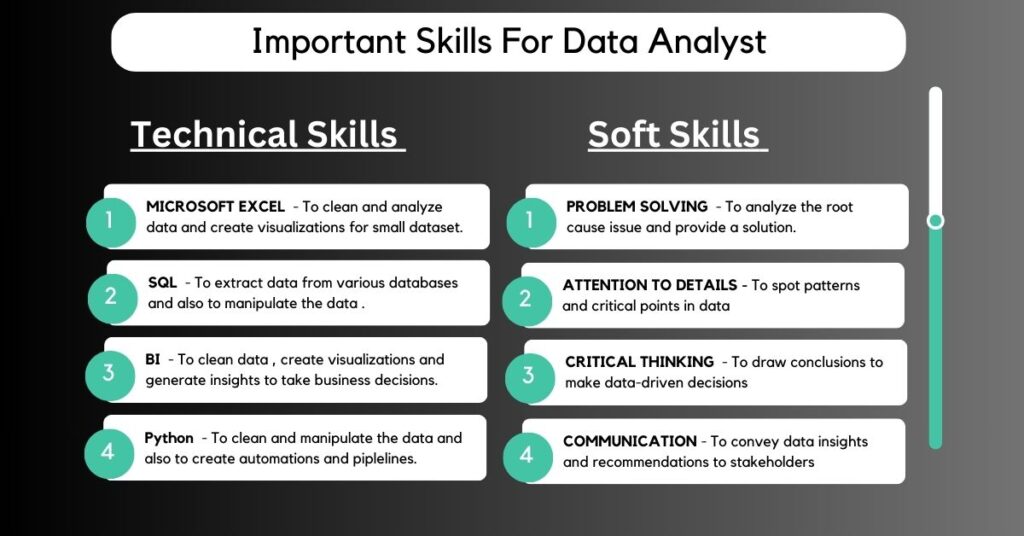
You have understood what you will need to do now it is time we look into the skills what it takes to become a data analyst.
As a data analyst you will have to work on data as well as you will need to communicate with the team to express your findings or ask for suggestions or question.
So it pretty clear that to excel as a data analyst, you need a mix of technical and soft skills , we will discuss both skills now
Technical skills required for a Data Analyst role
Technical skills are basically tools and skills that you will need to work on data and get answers to your questions from the data you are working on.
We will even understand for what purpose which tool is used.
So here are the technical skills and tools you will need as an data analyst.
1- Microsoft Excel
Microsoft excel can be considered as that veteran tool that might seem old but still plays an important and critical role.
Microsoft excel can be considered as the mother of business intelligence as it has all the capabilities like data cleaning , data visualization and it can be even used for data extraction as well.
But Microsoft Excel has its own limitations like it can handle only limited amount of data and it also has limited visualizations.
Related – How to Use Microsoft Excel for Data Analysis
2- SQL
SQL stands for Structured Query Language and it is the most important skill for data analyst .
It is close to impossible to become a great data analyst without the knowledge of SQL.
SQL is used to extract data from different data sources and it is also used to manipulate data , so if you are not able to extract the data on which you have to work how will you work ?
And that explains the importance of SQL.
Related : How To Learn SQL For Data Analysis
3- Visualization Tool
A visualization tool is used to visualize the data or you can say turn data into charts and graphs so that you can get the insights and take the decisions.
It is also very important tool which in 90% of the cases you will be needed to work on.
There are many Visualization tool in industry but currently Power BI and Tableau are the industry leader.
4- Coding Language
A coding language is not the necessary tool for a data analyst but there are times when it can be useful.
Also it depends on organization as well that they will use any coding language or not because most of the work can be dine without it as well.
You will need to use a coding language when you have to make future predictions based on the current and past data.
Two popular coding language for data analysis are Python and R , we will suggest you to go with Python as it is quite popular and most of the companies go with it , also it is easy to learn as compared to R.
REALTED : How to Learn Python for Data Science
Soft skills required for a Data Analyst role
As an data analyst you just not have to work on data and use your technical skills but there will be certain instances where you have to use your soft skills as well like presenting your findings or asking questions and communicating with stake holders.
So here are the soft skills you will need as an data analyst.
1- Problem Solving
You will use your problem solving skills to recognize some data related problems and then find the root cause and provide a solution to overcome it.
By using your problem solving skills you will need to Formulate and implement effective solutions to overcome these problems and make sure these problems do not arrive in future.
2- Attention to detail
As an analyst attention to detail is very crucial skill.
It will help you make sure your data is error free and precise to do thorough and meticulous data analysis
3- Critical Thinking
Not just data analyst critical thinking is the need of every decision making or decision influencing profile.
Critical thinking helps you analyze data critically to uncover underlying patterns and insights and use logical reasoning to draw conclusions to make data-driven decisions
4- Communication
Communication is the most important not just as analyst , in any job you are working or even your are not working communication is very important.
If you are great at communication you can express your ideas , suggestions and you can even ask questions.
Communication is key while conveying data insights and recommendations to stakeholders and working effectively with team members and other departments.
What are the different career path for a data analyst and Growth Opportunities.
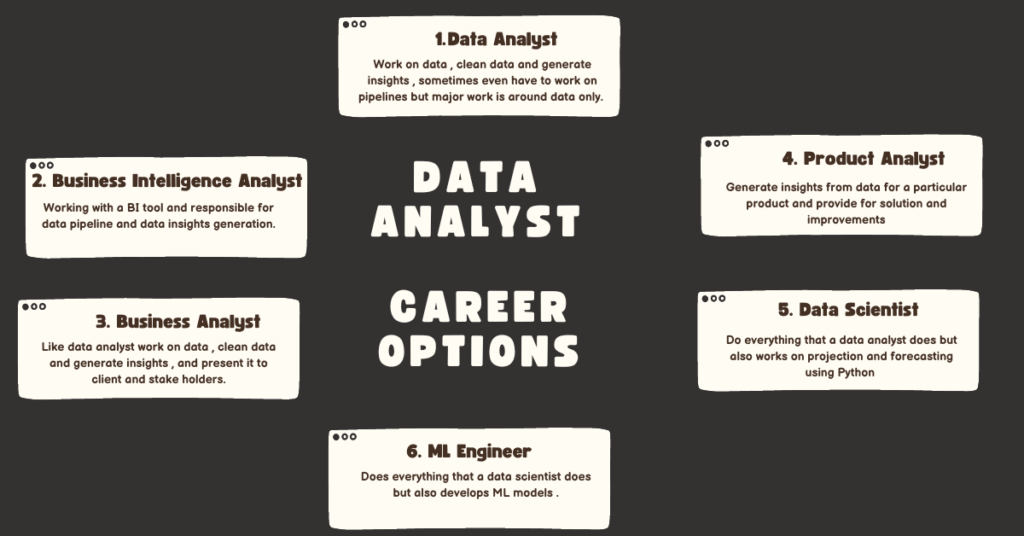
Data analyst or any other role related to data analysis is in it’s phase only with so much demand right now and it it will only grow in future.
You have already seen the revolution of data and now you are watching the revolution of AI but one thing you need to understand the underlying mechanism of AI is data only so to understand in easy words is that even AI needs data to train and work.
In future every company will be data company and every company will need to use their data to improve their business.
One thing you will need to understand that you might be in any role like you might be data analyst or data scientist or in any data role you just need to keep upgrading yourself with time to time and keep learning new tools and skills as per your career path and market demand.
So it will be very safe to say that there are so many growth opportunities in data domain that you just can not imagine.
Different career path for a Data Analyst role and Average Data Analyst salary ?
One surprise element in data analysis job domain is that you might start as a junior data analyst but you can switch to multiple role available in analytics role which we will discuss now.
We will also discuss the current average salary for data analyst role . These salaries are taken from Indeed so you can blindly trust them because they are posted by people working on these positions.
- Junior Data analyst: $58,090
- Data analyst: $75,307
- Senior data analyst: $97,348
- Business Intelligence Analyst: $89,504
- Product Analyst: $91988
- Data analytics manager: $89,287
- Financial analyst: $72,281
- Healthcare analyst: $63,411
- Insurance claims analyst: $51,033
- Marketing analyst: $65,848
- Systems analyst: $78,212
- Data scientist: $122,511
- Machine learning engineer: $146,352
- Data analytics consultant: $77,365
Starting as a junior data analyst, you can progress to roles such as senior data analyst, data scientist, or analytics manager. With experience and advanced skills, opportunities for career advancement are plentiful.
There are different roles in data domain as discussed above which have 80 to 90 % skills that are common in each role but certain role require your expertise in some specific tool or skill.
Also not that if you are aiming to be in more advanced role like Data Scientist or Machine Learning Engineer you will be needed to have great expertise in advanced skills such Machine Learning algorithm , Python and multiple other tools but the salary you will be getting much more than an entry level job.
Related : Business Analyst vs Data Analyst
What are the educational qualification required for Data Analyst ?
As such there is no particular qualification if you want to become a data analyst with no experience but if you have a degree in Math’s , Statistics or Economics than that might give you a 1% edge over others.
But if you do not have any of that , then it won’t affect you that much even me who is writing this article working as a Senior Data Analyst have a degree in Marketing and have a background in sales and marketing only .
So it is quite possible to get into analytics even if you have a degree in something that is completely opposite to a tech role and still earn sweet money.
You just need to be great at certain skills and not great you need to have good understanding required tools and skills and you are good to go.
So now lets us discuss a roadmap that will put you one step further than other people who are trying to get into analytics role. This data analyst roadmap is created with experience with the help of our multiple analysts who have made to organizations like Google , Microsoft and many other amazing organizations.
So you can trust this road map .
Best Roadmap For Data Analyst Role ?
So our this article on “How To Become A Data Analyst With No Experience” is not just an article but it is truly a data analyst roadmap and we can guarantee that this article will help you get your first job into analytics.
So let us understand what you have to do and how you have to do to get that data analyst job.
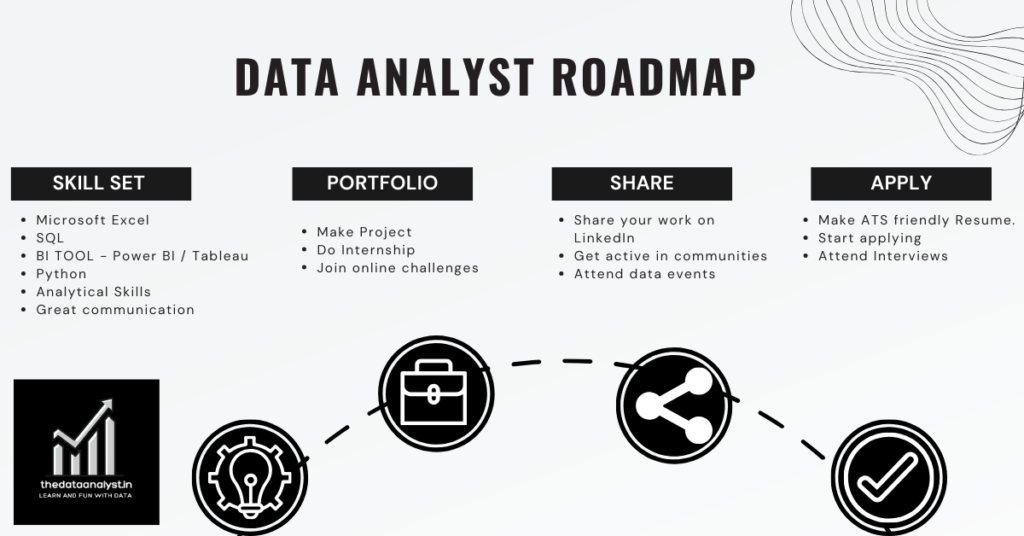
Best Roadmap For Data Analyst Role
So we will divide this roadmap into four parts so that it will be easy to follow and track.
Actually before first there is one more step that you will need to follow and that train your mind and have great belief system that you can do it and keep going because in the last it is just job in which already so many people are working so it possible and you will do it 100%.
Step 1: Developing the Required Skill set
The first basic thing for any job is to learn and master the skills and for Data Analyst as well you have to learn some skills let us get started.
1 – Microsoft Excel :
The most basic and most important tool you need to learn is Microsoft Excel . Start learning excel it shall take around 2 weeks as per your learning speed and efforts. You need not become a pro at it and you can avoid Macro and VBA initially.
2 – SQL:
After you have learnt the Excel now it is turn to learn SQL , it might seem a little bit over whelming in starting but trust me if you give it enough time than you can be pro at excel in very short span of time .
SQL is one skills that can guarantee you the analyst job so become very good at it and do not skip it at any cost.
3 – BI Tool:
You have mastered the art of getting the data now you need to learn how to get insights from the data that you extract with the help of SQL.
You can choose between Power BI or Tableau , I will suggest you start with Power BI as it is little bit easy to get started with.
You will use these tools for data extraction , data modeling , data cleaning and finally for data visualization .
4 – Python
Although Python is not mandatory but it can always put a little bit ahead than others and no you do not have to master it you just have to have a great understanding of Python basics.
Again note this skill is optional if you are just looking for an entry level there are high chances you will not need this skill.
5 – Statistical and Analytical Skills:
Now you need to work on your statistical and analytical skills ,these skills will be useful in extracting the insights from the data.
Step 2: Start Using the skills And Build a Portfolio
Now that you have learnt all the needed skills for data analysis , it is time use them and get some practical experience.
To make your portfolio you need to work on projects here are some ways you can make portfolio.
- Data Analysis Projects: Work on personal, academic, or freelance projects to build practical experience.
- Data Analysis Competitions: Participate in competitions like Kaggle to enhance your skills.
- Internships or Entry-Level Roles: Seek internships or junior data analyst positions to gain real-world experience.
You should create a portfolio showcasing your projects and skills. Include projects that shows all the skills you have included and worked.
Step 3: Share your work
You have learnt the skills , and even worked on multiple projects but what is the benefit if no one notices your efforts.
So the best thing is that start sharing your learning and projects online specially on LinkedIn and other possible platforms where people will notice your work and they might reach out to you with a job possibility.
Here are following ways you can share your work
- Online Communities: Join forums and communities related to data analysis.
- Local Meetups and Industry Events: Attend events to connect with professionals.
- LinkedIn: Use LinkedIn to connect with industry professionals and join relevant groups.
- Online Presence: Maintain a strong online presence on platforms like LinkedIn and GitHub.
- Personal Website: Create a website to showcase your portfolio and share your insights.
Step 4: Craft a Compelling Resume and Prepare for Interviews
Create an effective ATS friendly resume and start applying on multiple platforms on daily basis.
If possible you can connect with professionals to get your resume evaluated because resume is your first and most important thing that will get you an interview.
So start preparing for Interviews and apply on regular basis.
Important points to create ATS friendly compelling resume ?
Follow below points to craft a perfect resume
- Highlight Skills and Projects: Emphasize relevant skills, projects, and achievements.
- Tailor Your Resume: Customize your resume for each job application.
- Optimize for ATS: Ensure your resume is optimized for applicant tracking systems.
Important points to prepare for Data Analyst Interview
- Technical Questions: Prepare for questions on SQL, data visualization, and statistical analysis.
- Behavioral Questions: Practice answering questions about problem-solving, teamwork, and communication.
- Insightful Questions: Prepare questions to ask the interviewer about the role and company.
Related : Google Cloud Data Analyst Certificate
Final Words
Becoming a data analyst with no experience is a challenging but rewarding journey. By following the steps outlined in this “How To Become A Data Analyst With No Experience”, you can develop the necessary skills, gain practical experience, and build a strong personal brand.
Remember, the key to success is continuous learning and dedication. Start your journey today, and unlock the doors to a fulfilling career in data analysis.
FAQ: Data Analyst Roadmap
Is data analyst hard to get a job ?
If you are skilled enough and you are good a certain skills and tools needed for the job there are ample opportunities for you. More over the data is future so number of jobs available in market will double down in future.
Can a fresher be a data analyst?
Yes , a fresher can be data analyst you just need to have needed skills and analytical mindset.
If you can work on personal projects than it can put you ahead of many other candidates.
Can a non IT person become a data analyst?
Yes it is very much possible to become a data analyst if you are not from IT background. You just need to have a good hold of the skills needed for that.
By following this comprehensive guide, you’ll be well on your way to becoming a successful data analyst, even without prior experience.
Please rate this article and share your reviews also if you found this article useful please help to share it with your family , friends and co workers .
If you think there is something missing please comment and let us know we will be more than happy to work on it.
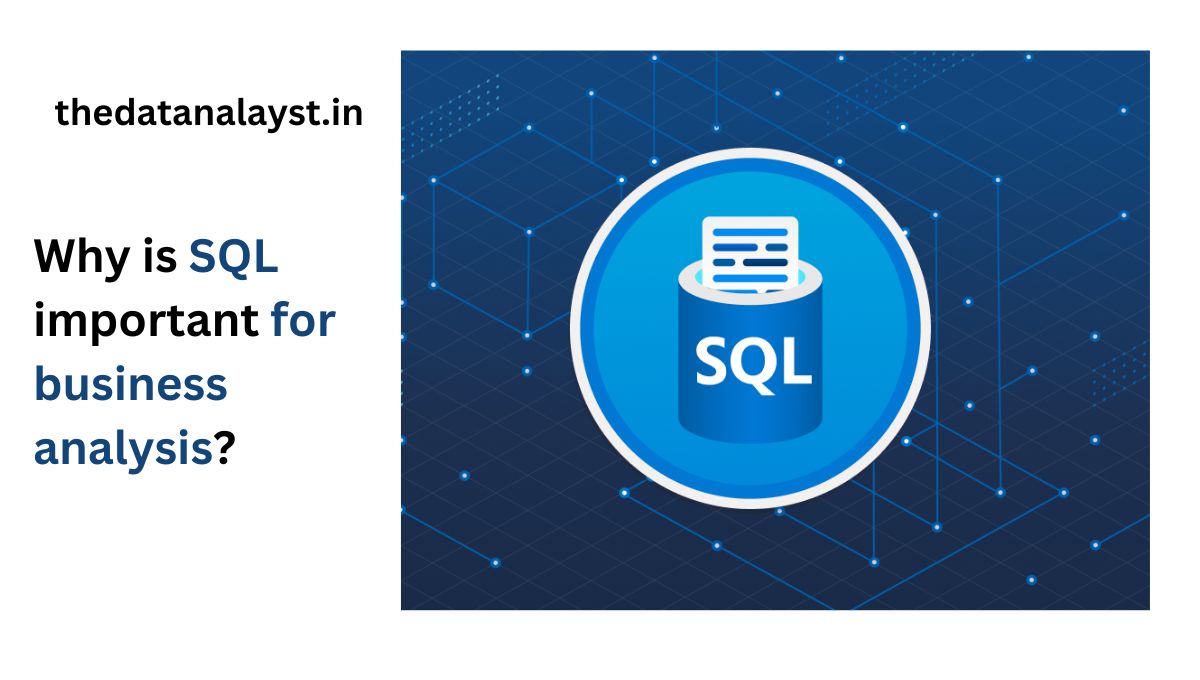
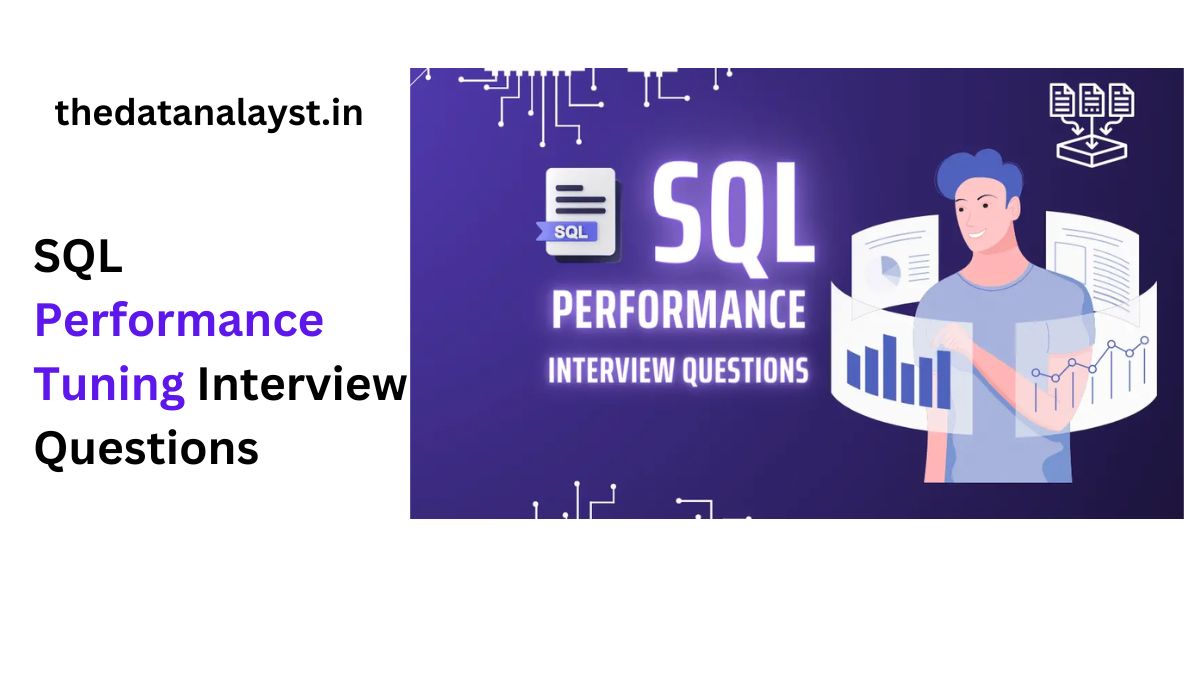
This article is very interesting and good, thank you for sharing the information.
Please visit my blog if you are interested.
SECARIK KATA
FAKTA BLUE
This article is very interesting and good, thank you for sharing the information.
Please visit my blog if you are interested.
SECARIK KATA
FAKTA BLUE